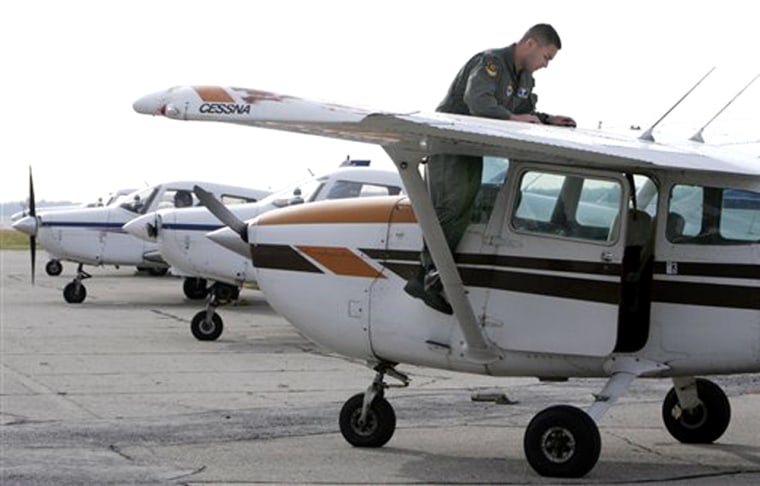Frostbite damage to his feet during World War II and a limp from a stroke prevented 81-year-old William Taylor from taking a commercial flight or driving to Washington see the nation’s new memorial to veterans of the war. But Taylor managed to get there anyway.
He flew via Honor Flight — a program of free flights for World War II veterans, started by a former Air Force pilot.
Once a month, a caravan of small planes filled with veterans and flown by volunteer pilots makes its way from Springfield to the nation’s capital and returns the same day.
If not for Honor Flight, Taylor probably would have never seen the memorial.
“I just sat there and looked at it. You just couldn’t believe that you were there,” he recalled. “It was really breathtaking.”
The program was set up by 46-year-old Earl Morse of Ohio, who worried that physical or financial limits were keeping World War II veterans from making it to Washington. He saw that many were dying before they got a chance to see the memorial.
Pilots use their own planes or sometimes rent them. The program relies entirely on donations, with veterans groups contributing toward some expenses.
Over 200 veterans on waiting list
So far, 132 veterans have flown on the Honor Flights since the program began last spring, and there is a waiting list of 257. The flights have become so popular that Morse quit his job last month to devote himself to the project full-time.
“You get bitten by this, and you can’t think of anything else,” Morse said. “The window itself is good for another five to 10 years. After that, it’s going to be a moot point because they’re all going to be gone. This is their last hurrah.”
Taylor, who got frostbite when he spent six months in a prison camp after being captured during the Battle of the Bulge in 1944-45, thought that being able to walk only short distances would exclude him from flights. But Morse made sure he was on the first flight in May, and even found wooden boxes for him to step on to get in the plane.
“I was overwhelmed,” Taylor said.
Leonard Loy, who enlisted at 17 and served in the Navy in the Mediterranean and at Okinawa in the Pacific during the war, said he was overjoyed when Morse asked him if he wanted to go with him to see the memorial.
“I’m too old to travel, and the other thing is I can’t afford it,” said the 80-year-old Springfield man. “There were tears in my eyes when he asked me.”
He said the memorial was beautiful. “I finally realized that we were finally honored,” he said.
Only 3.5 million of the 16 million Americans who served during World War II are still alive. About 1,000 die each day.
An estimated 7 million people have visited the memorial — a circle of 50 granite pillars flanked by arches around a pool and fountains — since it opened in 2004. Many World War II veterans visit in wheelchairs, or with walkers, canes or crutches.
“We really think they should see that memorial before they pass on,” said George Chekan, national president of the Veterans of the Battle of the Bulge Association. “It’s a must-see.”
A way of thanking veterans
Morse, who was a physician assistant for the Department of Veterans Affairs in Springfield, brought up the Honor Flight idea last January at a meeting of a recreational flying club. In a flash, he had 11 volunteer pilots and planes. The volunteer pilots have come from Ohio, Indiana, Michigan and North Carolina.
“The intent of the flight is to thank them,” said pilot Chris Sullivan, 36, of suburban Beavercreek. “It seems a little weird that they’re so thankful.”
Morse has suspended the flights until April because the cold weather can be a hazard for the small planes and there is less daylight for the flights.
Demand has been so great that Morse began buying seats on jetliners flying out the Dayton airport. He calls those Guardian Honor Flights, since he sends guardians to help the veterans tour the memorial.
